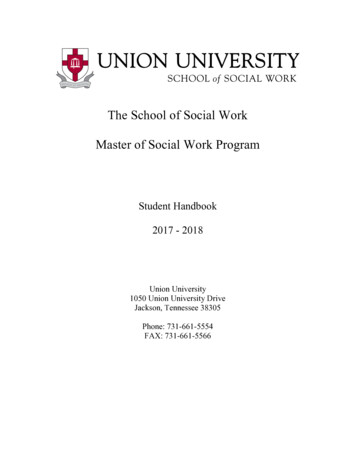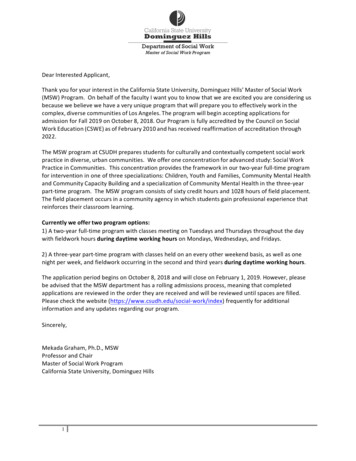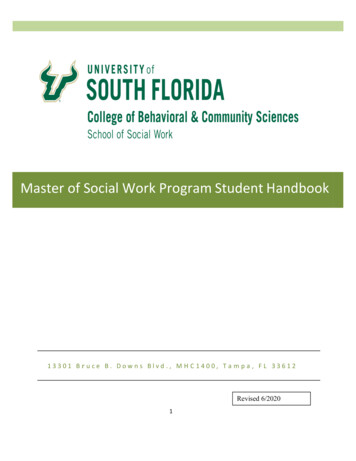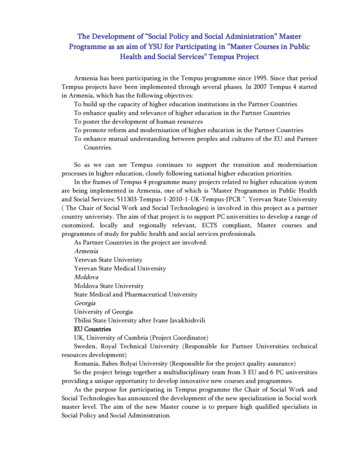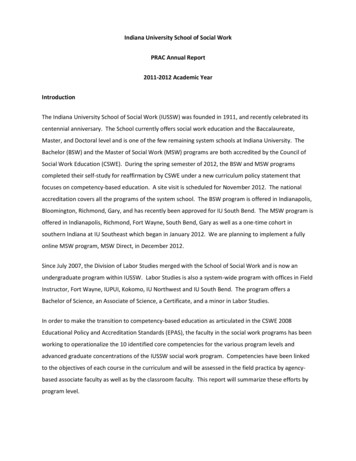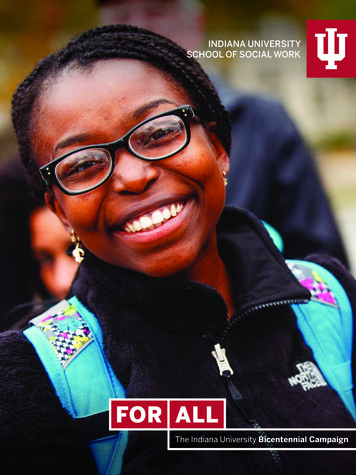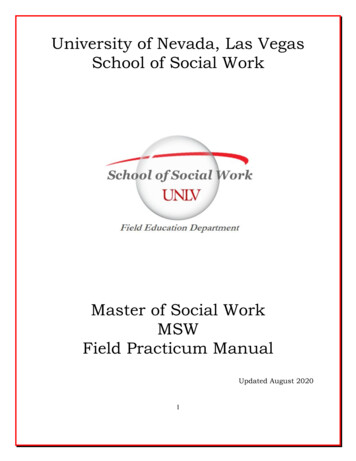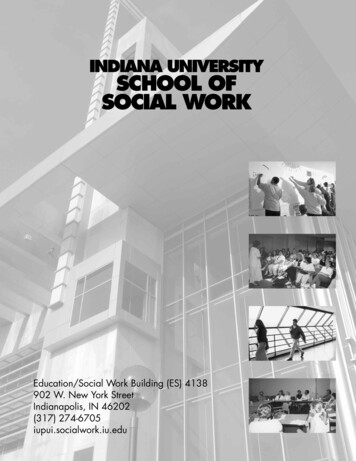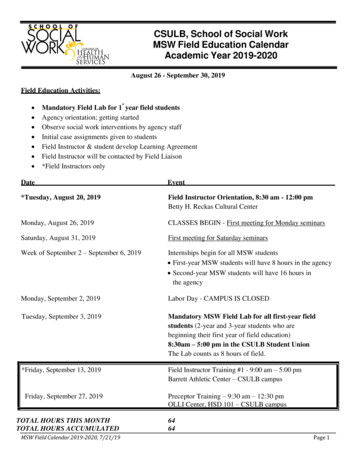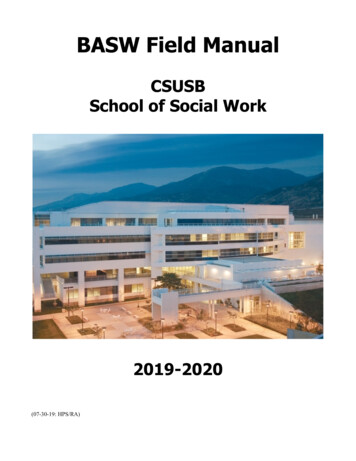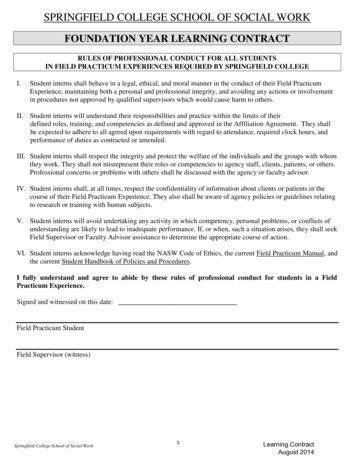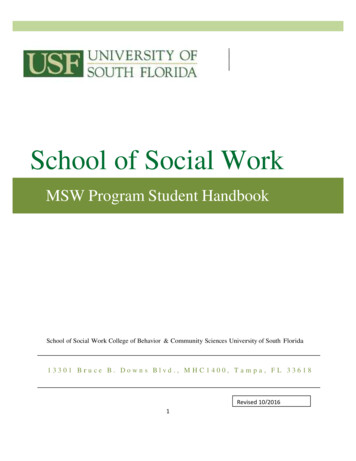
Transcription
School of Social WorkMSW Program Student HandbookSchool of Social Work College of Behavior & Community Sciences University of South Florida13301 Bru ce B. Down s Blvd ., M H C 1400, T a m p a , F L 33618Revised 10/20161
The M.S.W. Student Handbook provides information about School of Social Work and MSWProgram policies and requirements. Graduate students are ultimately responsible for their M.S.W. education, meeting graduation requirements, and assuring that they are in compliance withUniversity, Graduate School, college of Behavioral and Community Sciences and School ofSocial Work regulations, policies, and procedures. Please refer to the USF Graduate Catalog foradditional information about academic policies and graduation requirements.TABLE OF CONTENTSIntroductionMission44I. MSW ProgramClinical Social WorkCurriculumFull TimePart TimeField InstructionElectivesCapstoneMSW/MPH Dual Degree Program4455-66-99-10101111II. Academic ResourcesStudent DisabilityScholarships and FellowshipsMSW Advising11121212-13III. Student OpportunitiesBridge ClinicMaternal and Child Health TraineeshipClass representatives13131314IV. Student OrganizationsSocial Work SocietyPhi Alpha Delta Sigma ChapterSocial Work Alumni Society151515-1616V. Academic PoliciesEvaluation of Student ProgressAcademic ProbationIndividual Course WithdrawalRequest for Incomplete GradeProgram Withdrawal1616-171717-1818182
Program DismissalMissing Class Due to EmergencyOther Emergencies181919VI. Professional Standards19VII. Academic Integrity and StudentConductProblem & Conflict Resolution &Academic Grievance Process3191919-20
INTRODUCTIONCongratulations on your admission to the USF School of Social Work MSW program. The MSWStudent Handbook contains information about the graduate social work program, school andprogram policies and procedures, student rights and responsibilities, as well as pertinentinformation about our MSW program.OUR MISSIONThe mission of the University of South Florida, School of Social Work is to prepare graduates toachieve excellence as professionals and leaders in social work practice, research, and education.Our focus is to develop generalist social workers at the bachelor's level, clinical social workers atthe master's level and social work scholars at the doctoral level and to encourage students toembrace social work knowledge, ethics, skills, and values. Beginning inour own diverse region, and extending nationally and globally, we are committed to graduatingstudents who reflect the School's commitment to promoting social and economic justice,human rights, human dignity, scientific inquiry, and sustainable human and community wellbeing for all.I. MSW PROGRAM OVERVIEWThe MSW program is a specialized course of study designed to prepare graduates for clinicalpractice with individuals, families and groups in agency or organization-based communitypractice settings. The program is designed to produce graduates who exhibit professionalstandards, values, and ethics in the practice of social work; who demonstrate a respect forhuman beings and a commitment to the capacity for growth and change in people; and whodemonstrate the application of professional social work principles through professionaldiscipline and self-awareness in the service of all clients. Graduates will be able to engage in arange of practice methodologies appropriate for treatment of individual and family problemsand in work with groups.Program DescriptionThe graduate program in social work is a course of study designed to respond to an identifiedneed in the region for skilled clinical social work practitioners. It is built upon a core ofinformation basic to social work practice, followed by advanced scholarly study in preparationfor clinical work with individuals, families, and small groups. An intense field practicum affordsthe student the opportunity to apply theory gained in the classroom to the problems of agencyclients. The MSW program is fully accredited by the Council on Social Work Education.CurriculumThe MSW Social Work curriculum is organized so that courses are provided in sequence. Anyexceptions to taking courses in sequence must be approved by the MSW Chair/Committee.Failure to take courses as prescribed may jeopardize student progress and continuation in theprogram. The program does not grant social work course credit for life experience or previouswork experience.4
Students are admitted to the MSW Program in cohorts. Class sections are designated forparticular cohorts; students are not permitted to take course sections out of sequence or classsections intended for other cohorts. (For instance, students in the full-time program cannottake courses that are for part-time students). Any exceptions require approval of the MSWChair/Committee.Full-time ProgramTAMPA FULL TIME (TOTAL HOURS 60)11ST YEAR FALL SEMESTERCOURSE TITLECREDITSSOW 6105 Found in Human Behavior3SOW 6305 Foundations of Social Work Micro Practice3SOW 6348 Diversity and Social Justice3SOW 6186 Foundations of Social Work Macro Practice2SOW 6235 Foundations of Social Welfare and Policy3SOW 6534 Field Instruction I11ST YEAR SPRING SEMESTER*Advanced Standing Students Enter HereCOURSE TITLECREDITSSOW 6405 Foundations of Social Work Research &Statistics3*(AS do not take)SOW 6124 Psychopathology35
SOW 6342 Social Work Practices with Individuals3SOW 6535 Field Instruction II4*SOW 6931 Elective (AS & Non-AS**)3SOW 6931 Elective (AS only)3* AS - Do not take2ND YEAR FALL SEMESTERCOURSE TITLECREDITSSOW 6362 Social Work Practice with Couples andFamilies3SOW 6438 Evaluations of Clinical Practice in DiverseSettings3SOW 6236 Social Welfare Policy Development & Analysis3SOW 6536 Field Instruction III4SOW 6931 Elective (Non-AS only)3**2ND YEAR SPRING SEMESTERCOURSE TITLECREDITSSOW 6126 Health, Illness, & Disability2SOW 6368 Social Work Practice with Groups3SOW 6539 Field Instruction IV4SOW 8907 Capstone Project1SOW 6931 Elective (Non-AS only)3**6
Advanced Standing students are required to take 2 clinical electives for 6 credits.**Non-Advanced Standing students are required to take 3 clinical electives for 9 credits. Allclinical electives must be taken in the School of Social Work except, Students in the Dual MSW/MPHProgram can take all electives in the School of Public Health. That includes using core courses as electives.Students may take electives during any semester including summer sessions. However, non-ASstudents should consider taking electives as recommended in 1st Yr Spring, 1st Yr Summer, and 2ndYr Spring semesters.This schedule includes recent proposed changes to the graduate catalog that have been approvedby the CBCS and university curriculum. These changes should be reflected in the 2016-2017catalog.1Part-time ProgramTAMPA PART-TIME (TOTAL HOURS 60)11ST SEMESTER-FALLCOURSETITLECREDITSSOW 6105Found in Human Behavior3SOW 6305Foundations of Social Work Micro Practice3SOW 6348Diversity and Social Justice32ND SEMESTER-SPRINGCOURSETITLECREDITSSOW 6186Foundations of Social Work Macro Practice2SOW 6235Foundations of Social Welfare and Policy37
SOW 6534Field Instruction I13RD SEMESTER-SUMMERCOURSE TITLECREDITSSOW 6405 Foundations of Social Work Research & Statistics3SOW 6553 Field Instruction2SOW 6931 Elective34TH SEMESTER-FALL*Advanced Standing Students Enter HereCOURSE TITLECREDITSSOW 6124 Psychopathology3SOW 6342 Social Work Practices with Individuals3SOW 6554 Field Instruction (AS-Do not take)2*SOW 6931 Elective (AS only)3*** AS - Do not take**-AS only5TH SEMESTER-SPRINGCOURSE TITLECREDITSSOW 6362 Social Work Practice with Couples and Families3SOW 6438 Evaluations of Clinical Practice in Diverse Settings3SOW 6555 Field Instruction26TH SEMESTER-SUMMERCOURSE TITLECREDITS8
SOW 6126 Health, Illness, & Disability2SOW 6368 Social Work Practice with Groups3SOW 6556 Field Instruction27TH SEMESTER-FALLCOURSE TITLECREDITSSOW 6236 Social Welfare Policy Development & Analysis3SOW 6557 Field Instruction2SOW 6931 Elective38TH SEMESTER-SPRINGCOURSETITLECREDITSSOW 8907Capstone Project1SOW 6558Field Instruction2SOW 6931Elective3*Advanced Standing students are required to take 2 clinical electives for 6 credits.Non-Advanced Standing students are required to take 3 clinical electives for 9 credits. All clinicalelectives must be taken in the School of Social Work.1This schedule includes recent proposed changes to the graduate catalog that have been approvedby the CBCS and university curriculum. These changes should be reflected in the 2016-2017catalog.*AS-Advanced StandingFIELD INSTRUCTIONField Instruction enables students to learn contemporary practice skills related to their9
academic learning, the effectiveness of various modalities of intervention, and the opportunityfor applied research. The MSW program requires a minimum of 900 clock hours of fieldplacement (600 for Advanced Standing students). Full-time students are in the field 20 hoursper week for 3 semesters (Advanced Standing only 2 semesters). In addition, Non-AdvancedStanding Students will have a field seminar in their first semester. Part-time students are in thefield 12 hours per week for 5 semesters. The MSW program utilizes a single field placementmodel which means that the student is placed in one agency for the entire 900 hours (or 600hours for Advanced Standing) of field placement. Students are enrolled in a professionalseminar concurrently with the placement to assist with integrating the full learning experience.For more information regarding the Field program, consult the Field Manual (available on theUSF School of Social Work website).ElectivesAdvanced Standing students are required to take 2 clinical electives for 6 credits.Non-Advanced Standing students are required to take 3 clinical electives for 9 credits. All clinicalelectives must be taken in the School of Social Work. Students may take electives during anysemester including summer sessions. However, students should consider the program courseschedule for the recommended semesters for electives.10
Capstone ProjectThe Capstone project is a one-credit course which serves as a cumulative learning measure forthe MSW program. Students will complete an independent project which requires the synthesisof content from their theoretical, research, practice, field, and policy courses and theapplication of this content to a current field practicum case.MSW/MPH Dual Degree ProgramThe USF MSW/MPH dual-degree program offers social work students expanded study in publichealth and encourages a well-balanced macro-micro orientation to clinical practice. Suchexpansion can provide the social work student with specific skills that result in comprehensiveand effective client interventions in health care settings. The fundamental methodological toolsof public health, such as biostatistics, epidemiology, and health management and evaluation,further assist the social worker in targeting the needs of individuals and communities. TheMSW/MPH dual-degree program is a three to four year full-time course of study. The dualdegree offers concentrations in either Maternal & Child Health or Behavioral Health. Please seewebsite for additional information ns Information:Students may either apply to the School of Social Work or Public Health. After admission to aprogram they will submit the Dual Degree application, which is located on the Graduate Schoolswebsite. The application should be turned into the Program Specialist of their current programfor processing.School of Social Work MSW CommitteeThe MSW Committee, composed of School faculty, is responsible for all policy and proceduralmatters related to the MSW Program including curriculum research and student affairs. Theseresponsibilities include monitoring MSW student performance and progress in meetingprogram requirements, review of the program to assure program quality and outcomes, andaction on all matters of policy and procedure regarding the MSW Program. All student cohortsare represented on the Committee.II. ACADEMIC RESOURCESUSF Net ID, Canvas, Email Communication, School of Social Work ListServe, Writing Center,and Library. All students must obtain a USF NetID that allows access to MyUSF, Canvas (USFAcademic Portal), your USF Email account and USF Computer labs. The MSW listserve servesas a primary source of communication regarding program business and provides studentswith up-to-date information regarding school matters. The Writing Center provides freetutoring services to USF students who wish to strengthen their writing skills. The Libraryoffers programs, events, research tools and more.11
Canvas:https://webauth.usf.edu/login?service asWriting Center: (http://www.lib.usf.edu/writing/)USF Library: http://www.lib.usf.edu/Campus Life: http://www.usf.edu/Campus-Life/index.aspCounseling Center: http://usfweb2.usf.edu/counsel/Student Disabilities Services: http://www.sds.usf.eduCareer Center: http://www.career.usf.edu/STUDENT DISABILITY SERVICESThe School of Social Work is committed to work toward the elimination of any potential barrierto the education of a student accepted and enrolled in academic course work provided by thisSchool. As a way of demonstrating this commitment, the faculty of the School will make everyeffort to follow the policies and procedures outlined by the University and articulated by theUniversity’s Office of Student Disability Services.Student Disability Services (SDS) makes the final determination as to the type of need and thetype of assistance that can be rendered for students with disabilities. The process of applyingfor services is described in detail in the SDS website www.sds.usf.edu.SCHOLARSHIPS and FELLOWSHIPSThe School of Social Work has a very limited number of scholarships. Otherscholarships and fellowships are available http://socialwork.cbcs.usf.edu/DualDegree/MSW ADVISORA. Student AdvisingMSW students are assigned an advisor who provides assistance with academic,curriculum, and professional matters. Students are encouraged to take advantage of theadvising program.The role of the advisorincludes the following:To have contact with a student advisee as needed during the course of the MSW Program.The contact may be initiated by the student or the advisor. Examples of times that there mayneed to be advisor contact include:There are issues with credits needed for graduation; questions about electives to take, andother academic questions; the student needs a “sounding board” to prepare to communicatedirectly with another student, instructor, or staff member regarding a concern.12
May be involved in meetings, which can include serving on a Student Affairs Committee, whenthere are student concerns regarding an advisee and when an advisee initiates a grievanceprocess.Students in the MSW/MPH program are assigned two advisors: (1) faculty member in theSchool of Social Work knowledgeable about the dual degree, and (2) faculty member in theCollege of Public Health who helps coordinate the student’s course of study there.III. STUDENT OPPORTUNITIESStudent Graduate AssistantsA limited number of Graduate Assistantships are available in the School of Social Work. Fundingfor these assistantships varies from year to year, depending on budgetary constraintsexperienced by the University. Applications for the Graduate Assistants are typically open tothe first year students. They are assigned to work with 1-2 professors in the School. GraduateAssistantships are appointed for two semesters (fall/spring); however, appointment for thesecond semester is contingent on successful completion of the first semester. GraduateAssistantships are not renewable.These appointments are made based on academic achievement in undergraduate program;research, teaching, writing, and computer skills; essay for MSW program application; lettersof recommendation to the MSW program; and financial need. Graduate assistants are selectedby the Director of the School of Social Work in consultation with the Chair of the MSWProgram.Bridge ClinicThe mission of the BRIDGE Healthcare Clinic is to establish a long-term health carefacility in the University of South Florida vicinity that helps students learn to address the multidisciplinary healthcare needs of uninsured members of the University Area Community byproviding professional, compassionate care. Work collaboratively with USF Health students togain real life experience in culturally competent healthcare for the underserved.Educate patients about their current disease states, available resources, and primaryprevention in order to improve their long-term health.For additional information and to apply, students contact Dr. Christopher Simmons at:Csimmons4@usf.eduMaternal & Child Health TraineeshipThe Maternal and Child Health (MCH) Training Program, funded by the Maternal and ChildHealth Bureau (MCHB), aims to assure that “all children and families will live and thrive inhealthy communities served by a quality workforce that helps assure their health and wellbeing.” Both MCH academic and continuing education programs view leadership as essential13
for promoting health and preventing disease. The MCH Training Program offers a trainingapproach that is interdisciplinary and collaborative, and that is directed at understanding andpracticing the values of health equity, cultural competence, and family centeredness. Foradditional information and to apply, students contact Professor Martha Coulter at:MCoulter@health.usf.eduClass RepresentativeThe position of Class Representative is an elected position. This representative serves as aliaison between one’s classmates and the MSW Program Committee. The position is intendedto provide a means to enhance communication between both parties. Students are elected toyearly appointments via in class-voting, coordinated by the MSW Chair. A student may elect torun for consecutive terms. Each cohort may have up to two representatives for the year.However, on committee matters that involve a vote, each cohort will have one vote.MSW Class RepresentativeEach class or cohort (first year, second year and part-time) has representation on the MSWCommittee. The Class Representative is elected by students to a yearly (fall-spring)appointment. Each cohort may have up to two representatives for the year. However, “oncommittee” matters that involve a vote, each cohort will have one vote.MSW: Class Representative Position GuidelinesResponsibilities include:Acts as the spokesperson and represents classmates in all MSW program relatedmatters. Attends all MSW Program Committee meetings (in person or, when necessary and iffeasible, remotely, i.e., by telephone, Skype, etc.). In the event that at least one ClassRepresentative cannot attend, the class representative is responsible to arrange for alternaterepresentation. The Class Representative is knowledgeable about the grievance procedure andchain of command in the School of Social Work.The Class Representative will be listed on the agenda of every MSW Program14
Committee Meeting. The Class Representative is responsible for obtaining the dates and timesof the MSW Committee meetings from the MSW Program Chair and sharing this informationwith their classmates. The Class Representative solicits input from classmates and representsthem at meetings by asking for information and presenting issues that are current and relevantto their cohort. The Class Representative insures that all issues brought to the attention of theMSW Program Committee are appropriate. Appropriate issues to bring to the MSW ProgramCommittee meeting include (but are not limited to) macro-related issues regarding programguidelines and/or suggestions for improving current program guidelines.The Class Representative insures that personal issues involving individual classes and/orprofessors are addressed directly with the specific parties involved. The Clas
The USF MSW/MPH dual-degree program offers social work students expanded study in public health and encourages a well-balanced macro-micro orientation to clinical practice. Such expansion can provide the social work
